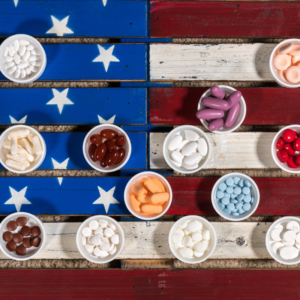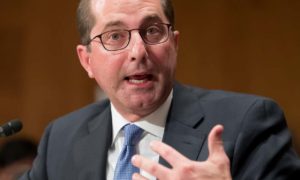by Gabriel Levitt, President, PharmacyChecker.com and Prescription Justice | Oct 26, 2018 | Drug Prices
 Yesterday, with great public relations fanfare, a new report from President Trump’s HHS was released showing that drug prices in other countries are often half the price they are in America. Who would have known? Well, for starters, the millions of Americans who are forced to shop internationally in order to afford their meds. Prices in other countries are actually much less than half for many drugs, but this report only looked at drugs in Medicare Part B, ones administered in a clinical setting by a healthcare provider – not picked up at the pharmacy.
Yesterday, with great public relations fanfare, a new report from President Trump’s HHS was released showing that drug prices in other countries are often half the price they are in America. Who would have known? Well, for starters, the millions of Americans who are forced to shop internationally in order to afford their meds. Prices in other countries are actually much less than half for many drugs, but this report only looked at drugs in Medicare Part B, ones administered in a clinical setting by a healthcare provider – not picked up at the pharmacy.
Trump’s rhetoric on drug prices is one of the few unifying issues in our deeply-divided country. Trump has stated on several occasions that the “drug companies are getting away with murder.” Murder. Now, while his administration hasn’t really done much at all on drug prices, the latest report puts it out there loud and clear: drug prices are insanely lower in other rich countries than here in the United States.
(more…)
Tagged with: Alex Azar, Donald Trump, politics
by Gabriel Levitt, President, PharmacyChecker.com and Prescription Justice | Oct 18, 2018 | Drug Prices
 As announced by HHS Secretary Alex Azar, the Trump administration is planning to force drug companies to include prices in their advertising. That means that, along with the long list of drug side effects that you hear during a TV ad, you’ll see the list prices. That list price is referred to as the wholesale acquisition cost, which is around the cash price you’d pay without insurance. Prices would have to be included in all ads for drugs covered by Medicare and Medicaid (i.e. pretty much all drugs).
As announced by HHS Secretary Alex Azar, the Trump administration is planning to force drug companies to include prices in their advertising. That means that, along with the long list of drug side effects that you hear during a TV ad, you’ll see the list prices. That list price is referred to as the wholesale acquisition cost, which is around the cash price you’d pay without insurance. Prices would have to be included in all ads for drugs covered by Medicare and Medicaid (i.e. pretty much all drugs).
I don’t particularly love this idea, but it is better than nothing.
The goal of this policy is to control drug prices by making them more transparent. Sound unlikely? It has a noble free market, pro-consumer ring to it, which I kind of like. It will be fun to see how this plays out, but it’s a minuscule policy move that won’t bring the kind of drug price relief that Americans want and need. In the proposed rule, Azar, or whichever of his staff wrote it, is all high and mighty about transparency and market efficiency:
“Markets operate more efficiently when consumers have relevant information about a product, including its price, as well as alternative products and their prices, before making an informed decision whether to buy that product or, instead, a competing one.”
At PharmacyChecker, we know a lot about the importance of drug price transparency. That happens to be one of the things we’re best at (along with verifying pharmacy practice standards). Our recognized forte is international pharmacy drug price transparency.
Here’s a scenario for you:
In this future world of Azarian drug price transparency, Jorge from Brooklyn will be watching the baseball game (maybe the Yankees in the World Series next year), and he’ll see an ad by Merck for the drug, Januvia. Jorge has just learned he has Type 2 diabetes and has a prescription. He’ll hear that Januvia can help lower his blood sugar, which is good. Then, he’ll hear that the side effects could include joint pain, a skin reaction requiring treatment in a hospital, and even death from pancreatitis. He gets that all these ads have to list those side effects.
Then he hears: it’s $550 for a one-month supply; but, wait, it will likely cost much less with insurance! That doesn’t exactly help. Jorge is one of 30 million uninsured Americans, and $550 is more than he can afford after paying his rent, groceries, gas bill, his daughter’s ballet classes, and his son’s asthma inhaler. Yes, he’ll hear there are Januvia patient assistance programs that might be able to help. Let’s hope so…because people often don’t qualify.
There’s no generic competition for this drug in Brooklyn. Unlike generic drugs, you can’t pharmacy hop for the best price or find a significantly lower U.S. price on the web. So what good is that transparency other than a minor slap on the hand to Big Pharma?
45 million Americans didn’t fill a script in 2016 because they faced similar situations to Jorge.
But there’s hope! When my fellow Americans visit www.pharmacychecker.com, they are blown away that the price of a drug is almost nine times higher in the U.S. than in Canada – and, yes, I mean Canada (not India or Turkey, where drug prices are even lower, and for the same drug).
On our website, Jorge learns that brand-name Januvia is $270 for a three-month supply if he orders it from Canada. Now that’s Drug Price Transparency! It’s a massive punch to the Big Pharma gut.
|
Januvia Prices in the U.S. vs. Canada
|
| Drug |
U.S. Price |
Canadian Online Pharmacy Price |
Savings |
| Januvia 100 mg |
$1,593.90 |
$269.94 |
83% |
Canadian pharmacy prices among verified international online pharmacies in the PharmacyChecker Verification Program are ones he can afford. If he cannot, then those same online pharmacies may also refer orders to pharmacies outside of Canada, which may have even lower prices.
Azar’s proposal shows just how vulnerable Americans are
To the credit of Azar’s proposed rule, it at least identifies how incredibly vulnerable Americans are to drug prices.
- Uninsured paying cash prices
- Insured finding that PBM formularies don’t cover all drugs
- Insured finding they must pay co-insurance of 30-60% (not just copays) on really expensive drugs (in the many thousands per month)
These coverage gaps affect tens of millions of people each year, which is why we have a crisis. Making drug companies note the price in TV ads while leaving the patient powerless to do anything stinks.
Interestingly, one drug company, Johnson & Johnson, warns that this is a bad idea because people might end up not taking their prescribed medications. The Onion couldn’t do better than this. It’s not The Onion, though. It’s Bloomberg: J&J Says Putting Drug Prices in Ads May Scare Away Patients.
From the mouth of Big Pharma…
Tagged with: Alex Azar, Drug advertising, Januvia, politics, transparency
by Gabriel Levitt, President, PharmacyChecker.com and Prescription Justice | Jul 20, 2018 | Drug Importation

Azar is proposing a discussion about allowing imports of single-source drugs to lower costs
Yesterday, Health and Human Services Secretary Alex Azar announced that he was tasking FDA Commissioner Scott Gottlieb with forming a working group to explore how drug importation could be used to lower prices. See Gottlieb’s remarks on the proposal.
The crux of the proposal is very narrow. Azar is considering allowing imports of foreign versions of off-patent medicines that only one manufacturer (also referred to as “single-source” drugs) is selling in the U.S. market. That would be a drug without any competition where the company with the marketing license jacks the price. Keep in mind that he has simply called for a working group to discuss it.
I’m getting asked a lot of questions about this proposal and realize that many people, including well-informed journalists and policy professionals, don’t really get this.
People who already import medicines, through buying them online or carrying them home from Canada to save money may also be confused!
So, to help any and all understand what HHS and the FDA are considering when it comes to drug importation, below are some important takeaways. My general take, as noted in the Washington Post, is that it’s a step in the right direction (if it goes forward), and it could help educate the public about greater potential benefits to larger scale importation.
- This is not legalizing buying cheaper, FDA-approved meds from retail pharmacies in Canada online or otherwise.
- Millions of Americans already benefit from importing lower-cost, safe and effective medicines for personal use. They do this despite the existing federal prohibitions and scare tactics employed by industry-funded groups to deter such purchases. To do so safely, they stick to credentialed online pharmacies, such as those verified by PharmacyChecker.com. Today, Roger Bate, who is affiliated with the American Enterprise Institute, wrote: “All the FDA has to do is allow Pharmacy Checker to do its job and tell the American people about it.”
(more…)
Tagged with: Alex Azar, politics, Roger Bate, Scott Gottlieb
 Yesterday, with great public relations fanfare, a new report from President Trump’s HHS was released showing that drug prices in other countries are often half the price they are in America. Who would have known? Well, for starters, the millions of Americans who are forced to shop internationally in order to afford their meds. Prices in other countries are actually much less than half for many drugs, but this report only looked at drugs in Medicare Part B, ones administered in a clinical setting by a healthcare provider – not picked up at the pharmacy.
Yesterday, with great public relations fanfare, a new report from President Trump’s HHS was released showing that drug prices in other countries are often half the price they are in America. Who would have known? Well, for starters, the millions of Americans who are forced to shop internationally in order to afford their meds. Prices in other countries are actually much less than half for many drugs, but this report only looked at drugs in Medicare Part B, ones administered in a clinical setting by a healthcare provider – not picked up at the pharmacy.



